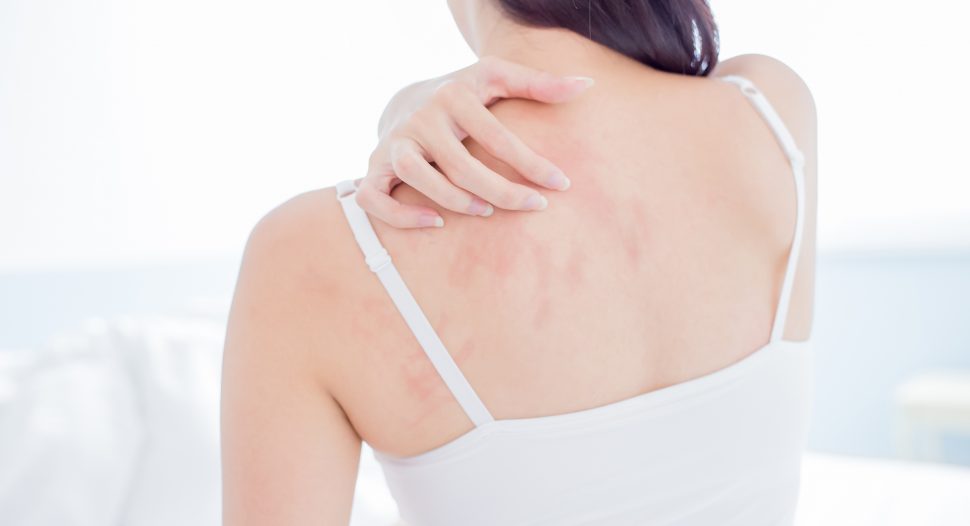What is eczema?
Eczema is a recurring, non-infectious, inflammatory skin condition. It is also often called dermatitis. The most common type of eczema is known as atopic dermatitis. It is common in children but can occur at any age. The majority of affected children will “grow out” of the condition by their early teens. However, eczema can be chronic and tends to flare up periodically. It can impair the quality of life of patients and their families, if the condition is not treated.
Some common forms of eczema include:
Contact dermatitis
A localised flare-up when you have direct contact with an allergen.
Dyshidrotic eczema
Presented as blisters that form on soles and/or palms. Sometimes deep cracks can appear on the hands/ fingers, which can be very painful.
Seborrheic dermatitis
Appear as scaly, inflamed patches that are found commonly on scalp, face and chest.
The signs and symptoms may vary amongst individuals, and include:
- Dry skin
- Intense itch
- Red, scaly rash or lesions
- Skin weeping watery fluid
- Thickening of skin due to scratching
- Possible infections such as pus-filled bumps, pain, or redness
These symptoms are commonly observed on the insides of elbows, behind knees, on cheeks, forehead and limbs.
Risk factors
Factors increasing the chance of having eczema include:
- Family history of eczema
- Asthma
- Allergic rhinitis
- Environmental factors, e.g. with higher levels of pollution or a cold climate
Triggers
- Weather (hot and humid or cold and dry conditions)
- Air conditioning resulting in a cold and dry environment
- Environment allergens like pollen, dust mites and grass
- Overheating during activities like exercise; leading to excessive perspiration and increase in body temperature
- Bacterial or fungal infections of the skin
- Emotional stress or hormonal changes
- Food like dairy, wheat products, citrus fruits, eggs, nuts, seafood, chemical food additives, preservatives and colorings
- Chemicals like strong cleansers, detergents and chlorine in swimming pool
Prevention (Lifestyle Management)
There is no cure for eczema but there are treatments, depending on the type of eczema and severity, to help control your signs and symptoms.
- Identify and avoid triggers that worsen your eczema
Environmental triggers could be the cause of eczema. People with severe eczema may also find it helpful to do an allergy test to help establish trigger factors. Common allergen triggers include dust mites, pollen and pet dander.
- Take shorter baths/showers
To prevent excessive drying of the skin, it is recommended to limit baths to 10-15 minutes. It is better to use lukewarm instead of hot water.
- Use gentle soaps or bath oils
People with eczema have sensitive skin. Irritants such as perfumed soaps or detergents can trigger a flare-up.
- Avoid abrupt changes in temperature
Abrupt changes in humidity and temperature can irritate your skin. Heavy exercise that makes you sweat a lot can also trigger eczema.
- Manage stress and anxiety
Stress and other emotional disorders can worsen or trigger your eczema.
Treatment of eczema
There is no cure for eczema but there are treatments, depending on the type of eczema and severity, to help control your signs and symptoms.
- Protect skin
Apply a suitable moisturiser daily to clean and dry skin, not just on the areas with eczema. Multiple applications can be done throughout the day. However, it is especially important to moisturise directly after bathing to lock in the moisture in the skin.
- Treat flare-ups
Occasional and non-prolonged use of steroid cream can help reduce inflammation and itchiness. It is important to not confuse the concurrent use of steroid creams and moisturisers. Apply the moisturiser first, wait for 10-15 minutes before applying the steroid cream onto the areas with eczema.
- Control itch
Antihistamines can help reduce itching and improve your quality of life, especially when the itching keeps you up at night. Generally, you can use a non-drowsy antihistamine during the day to curb the itching or a drowsy antihistamine for the night.
From topical to oral therapy, you can get all you need to get your eczema under control at your nearest Unity store here.



